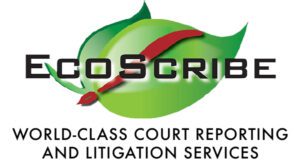Remote depositions are used more and more frequently, especially after the COVID-19 pandemic. There are nuances to creating accurate remote deposition transcripts that can be a challenge if you are working with an inexperienced court reporter or legal team. Our team at EcoScribe has been performing remote depositions for many years as a virtual company, and we understand the best practices to use to ensure the most accurate remote depositions and transcripts.

Preparation for Remote Depositions
Planning and preparation by both the attorneys and legal team as well as the court reporter are integral to creating an accurate and fruitful remote deposition. There are many pitfalls that can be avoided by planning for the deposition and communicating effectively. Some of the preparations that should be made before the deposition include:
- Sharing all documents that will be used in the deposition. This ensures the court reporter has all quotes, exhibits, documentation and other information that will be discussed during the deposition.
- Preparing the virtual meeting room. The court reporter is often the virtual host for the deposition and will ensure that the virtual meeting room is scheduled, exhibits and documentation are uploaded, and all entities are invited to the meeting.
- Reviewing keywords and phrases. If the deposition includes technical, medical or niche information or keywords, it is important for the court reporter to review specific terms that may be used during the deposition. These should be provided by the legal team to facilitate an accurate deposition and for correct spelling in the transcripts.
- Technology preparation. Ensuring that all technical aspects are working correctly before the remote deposition can make the process go smoothly. It is vital to have advanced audio and video equipment for the best-quality recordings.
Communication and planning before the remote deposition between all parties can reduce the chance of delays or inaccuracies during the interview.
Setting Expectations for Accurate Remote Deposition Transcripts
Experienced court reporters are comfortable setting expectations for everyone involved within the remote deposition. This can avoid muffled conversations or crosstalk that can impact the clear recording of the deposition. Before the deposition begins, each participant should identify themselves, starting with the court reporter, recording their name and affiliation. The court reporter may reiterate the importance of waiting for each speaker to finish before answering and for each participant to speak clearly into the microphone.
Skilled Court Reporting During Depositions
During the remote deposition, a skilled court reporter can transcribe up to 200 words a minute. If there are any unclear responses, verbal or non-verbal, the court reporter should ask for clarification to ensure the accuracy and integrity of the deposition transcript. If the right preparations are made and expectations are followed, the resulting transcription should be precise and contain accurate information that is crucial to the litigator’s case.
Highly Experienced Remote Deposition Court Reporters
At EcoScribe, we have worked with legal teams throughout the world to provide clear and accurate remote deposition transcripts. Each state has different laws regarding remote depositions to which our team adheres. If your legal team needs the assistance of a highly skilled and experienced court reporter to facilitate a remote deposition, you can trust our team at EcoScribe. Contact us at 888.651.0505 to discuss preparation for your next remote deposition.

